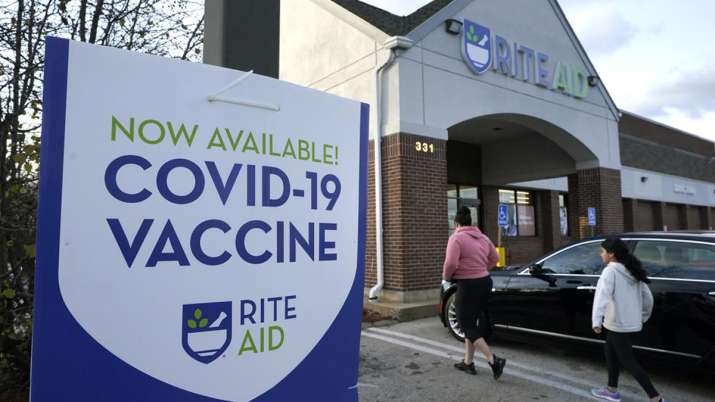
Nashua, NH. People walk past a COVID-19 vaccine sign as they enter a Right Aid pharmacy in
The number of fully vaccinated Americans against COVID-19 reached 200 million on Wednesday, with cases and hospitalizations also affecting New England, one of the most highly vaccinated corners of the country. There’s a controversial spike in the holiday season.
New cases in the US rose from an average of about 95,000 daily on November 22 to nearly 119,000 this week, and a 25% increase in hospitalizations compared to a month ago. The increase is almost entirely attributable to the delta variant, although omicron mutations have been detected in about 20 states and are sure to spread even further.
Deaths are running on an average daily closer to 1,600, where they were in October. And the death toll in the US less than two years into the crisis could hit another heartbreaking milestone, 800,000, in a matter of days.
The situation before the public had access to COVID-19 vaccines isn’t as dire as last year’s holiday season surge, but the 60% of the US population that has been fully vaccinated is the only way to prevent hot spots. is not sufficient.
Cold weather, a major rebound in Thanksgiving celebrations and holiday travel are all believed to play a part, along with pandemic restrictions as public fatigues.
Lawrence Gostin, director of the WHO Collaborating Center on Public Health Law and Human Rights at Georgetown University, compared the virus to wildfire.
“You can clear the forest of bushes. But if you leave some bushes and trees standing, the fire will get to them,” Gostin said. “The virus will find you. It’s looking for hosts that aren’t immune. The fact that you’re in New England or New Zealand.” Living in New York doesn’t affect you.”
Demand for the vaccine – with the recent approval of boosters for all adults and shots for elementary school children – has been high amid the rise and emergence of the Omron variant, the dangers of which are still not fully understood. On Wednesday, Pfizer said its initial two shots of the vaccine appear to be significantly less effective against Omicron, but that a booster dose could provide significant protection.
According to the Centers for Disease Control and Prevention, about 48 million people have received the booster. White House officials noted that the US delivered 12.5 million shots last week, the highest weekly total shot since May.
“And this is significant progress as we go into winter and face the new Omicron version,” said White House coronavirus adviser Jeffrey Ziants.
At the same time, some states, particularly in highly vaccinated New England but also in the Midwest, are battling some of the worst surges since the start of the pandemic. Hospitals are filling up and responding by canceling non-urgent surgeries or taking other crisis measures, while states are strongly promoting boosters.
Despite one of the highest vaccination levels in the country—more than 74% of the population fully vaccinated—Vermont is facing its biggest surge yet. In the past week, new cases per day have increased by 54%, and the number of people with COVID-19 in hospital has climbed 18%.
The virus is preying on those who haven’t had their shots: As of Tuesday, 90% of COVID-19 patients in intensive care had not been vaccinated.
“Obviously this is not where we want to be,” Governor Phil Scott said on Tuesday, describing the situation as “extremely hopeless”.
More than 400 people were in hospital with COVID-19 in New Hampshire at the start of the week, a record set last winter.
New Hampshire Governor Chris Sununu directed hospitals to set up COVID-19 “surge centers” using space normally reserved for things like outpatient care.
“For the next several weeks, we are likely to see a new high in COVID hospitalizations in New Hampshire,” said Steve Ahnen, president of the New Hampshire Hospital Association. “With over 1,000 new cases a day, this number is going to do nothing but keep rising.”
Maine is also battling record-breaking COVID-19 hospitalizations. Government Janet Mills on Wednesday activated 75 members of the National Guard to help.
“Most of the patients in our hospitals have not been vaccinated. This is especially true for critical care patients,” said Andy Muller, CEO of MenHealth, the state’s largest health network. “It requires a tremendous amount of our resources to provide care.”
Rhode Island’s largest hospital system, Lifespan, said staff shortages are at a crisis level never seen before, while Kent Hospital said it is close to capacity and is considering delaying non-urgent procedures.
Kent’s interim president and chief operating officer Dr. Pari Gopalakrishnan said the spike was probably due to “people letting their guard down” during the holidays, and flu season could complicate things further.
New Hampshire plans to hold a “booster blitz” at 15 locations on Saturday. Most of the appointments were booked.
In Berlin, Vermont, Mike LeBounty got his booster Tuesday.
“I have friends who are getting sick in their 20s and friends who are in their 60s who are getting sick,” he said. “All you see on Facebook and things like, ‘I just want to end this. I’m so sick, so I’m trying to avoid it.'”
Elsewhere across the country, Indiana has seen COVID-19 hospital admissions double in the past month and is approaching levels not seen since this time a year ago, before vaccines became widely available.
The number of people in intensive care in Minnesota has reached an all-time high during the pandemic, with 98% of ICU beds. Teams of military medics have been sent to Michigan and New Mexico.
Read more: Omicron ‘almost certainly’ no more serious than Delta version: top US scientist Fauci
,